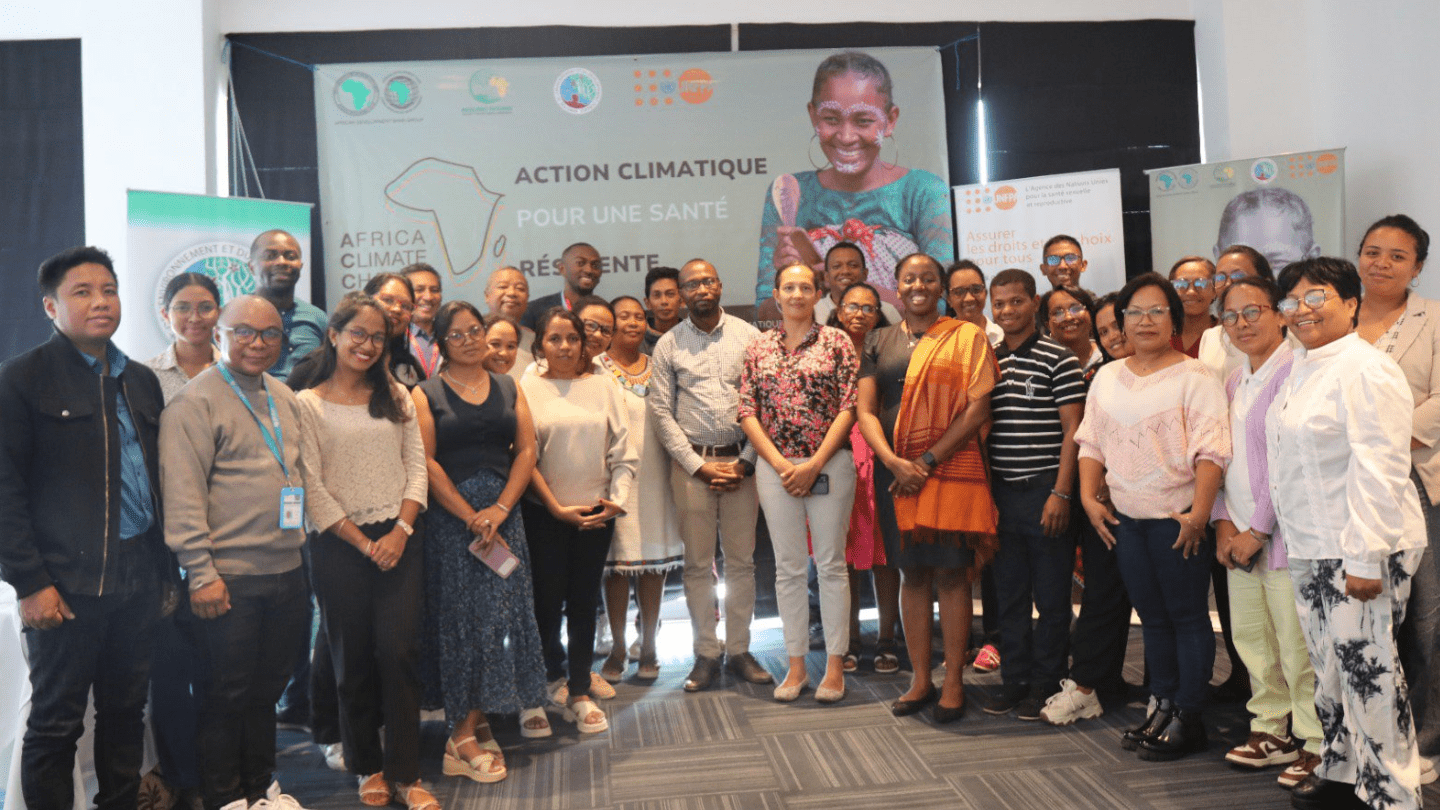Antananarivo, April 17, 2025 – Madagascar is taking a bold and decisive step in climate action by integrating Sexual and Reproductive Health and Rights (SRHR) and Gender Equality into its climate policies and programming.
From April 14 to 17, 2025, 42 national experts from ministries, UN agencies, civil society organizations, youths, and research centers gathered at the Centell Hotel & Spa in Antanimena, Antananarivo. This strategic training was jointly organized by the Ministry of Environment and Sustainable Development (MEDD) and UNFPA, with support from the Africa Climate Change Fund (ACCF) managed by the African Development Bank (AfDB).
- An innovative and integrated approach
This program is part of an innovative approach that places health, equality, and resilience at the heart of climate action. It responds to an urgent need: women, girls, and vulnerable communities who are the first affected by climate crises, particularly in the Grand Sud of Madagascar where social inequalities and access to basic services are further exacerbated.
Ms. Josiane YAGUIBOU, UNFPA Representative in Madagascar, stated at the opening ceremony:
"With this training on the integration of sexual and reproductive health and rights (SRHR) and gender equality into climate action, we can make a difference. UNFPA remains fully committed alongside the Government and partners to ensure that every woman, every young person, and every community has access to the services, rights, and opportunities necessary to build a fairer and more climate-resilient future."
For her part, Dr. Lovakanto RAVELOMANANA, Coordinator of the National Bureau for Climate Change and Reducing Emissions from Deforestation and Forest Degradation (REDD+), emphasized:
"Gender is at the heart of climate issues. It is essential to listen to women’s voices and ensure their full participation in decision-making spaces. True inclusion is reflected through strong female representation."
- Expert training
This initiative aimed to:
- better understand the interactions between climate, sexual and reproductive health, gender, and social vulnerability;
- explore concrete and multisectoral solutions to strengthen the resilience of women and girls in the face of natural disasters;
- promote the continuity of health services in emergency situations, particularly those related to maternal, neonatal, adolescent health, and the fight against gender-based violence (GBV); and
- engage participants around a concrete action plan aimed at integrating SRHR, GBV, and harmful practices into national climate policies.
Participants shared their insights:
‘’Inspiring young people through storytelling in climate change, reproductive health & gender equality can make a difference’’: Iangotiana ANDRIAMITANDRINA, AIKA Alliance
‘’Ensuring effective water management & promoting reforestation are essential for safeguarding the well-being of women and girls amid the climate crisis’’: Bruno Alain RAOELINA, Ministry of Agriculture and Livestock
- International experiences sharing
The workshop benefited from the best practices of other countries such as Bangladesh and Zambia and the expertise of UNFPA East and Southern Africa Regional Office (ESARO), offering participants comparative perspectives and approaches adapted to the Malagasy context.
- A commitment to an inclusive and sustainable future
This training embodies Madagascar's ambition to reduce vulnerability to climate change while promoting inclusive and equitable governance, which is in line with the 2030 SDG Agenda and the Paris Agreement. It comes at a strategic time when the country is about to commence the development of its Nationally Determined Contribution (NDC) generation 3.0 which will be submitted by the end of 2025.
Presentation of the action plan resulting from the workshop by the Humanitarian Coordinator, UNFPA Madagascar (Dr Elizabeth TARH)
Strategic collaborations across relevant government Ministries and partners were discussed in the workshop, and avenues for climate financing were explored. As part of the outcome of the workshop, a climate vulnerability assessment on gender, SRHR, GBV, and harmful practices commissioned by UNFPA and funded by the ACCF will be completed in the coming months to inform the key national climate plans and policies under development.


